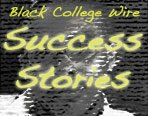| NCCU Senior Fights to be Re-admitted |  |
 |
 |
| By Hannah Hiles -- Black College Wire | |
|
Over the past two months, North Carolina Central student Roderick Howell has been fighting to be re-admitted. As a result of his suspension, Howell is without health insurance because the University was his provider, he is without work and food stamps because he lost his on campus job, and will soon lose his housing, he said. It all began on Aug. 18. Howell was having a rough day. He was stressed about work and school. He hadn't been eating or sleeping. His car had died that morning. He had one thing on his mind — reading his Bible. "I was so wound up I couldn't hardly read the Bible in front of me," said Howell, who was in the James E. Shepard Library at the time. 
The Campus Echo
Rodrick Howell
And that's when something snapped. He grabbed her by the arm. She screamed. And then the police arrived. He didn't know it at the time, but he was having a manic episode with psychotic features. Howell was taken to the Williams Ward at Duke University Hospital, where he was placed under medical observation and diagnosed with bipolar affective disorder, an affliction that strikes 1.1 percent of the adult population. He remained hospitalized until Aug. 26. He was given medication and intensive therapy sessions. "People think I was at a crazy house," Howell recalled. “We have to have a better understanding of how this works because really they were just talking to me. They explained to me how my condition works." While at the Williams Ward he received a letter signed by North Carolina Central’s Assistant Dean of Students Gary Brown, informing him that he was on interim suspension and that there would be an Aug. 30 judicial hearing to determine whether his suspension would be permanent. Howell said he met with NCCU therapist Carolyn Moore and psychologist Carol Gibbs before the hearing. They had found him in stable mental condition and wrote letters supporting his return to NCCU. Howell said, both Moore and Gibbs thought his interim suspension would be dismissed, given the circumstances surrounding his behavior in the library. The hearing lasted an hour and a half. The next day, Howell was given the results of the hearing — expulsion from NCCU for a year, the maximum allowed sentence. "I was shocked. I just thought that with the medical procedure, it would have changed the outcome of the case," Howell said. "Here I have just found out about this condition, and they're tellin' me, ‘No, we're gonna kick you outta school.'" So Howell began to build his appeal. He found a lawyer, who showed him he hadn't received due process according to his rights in the Student Code of Conduct. In a Sept. 7 letter to NCCU Chancellor Charlie Nelms, Howell described his diagnosis and outlined seven items that he says were violated by NCCU: There was no pre-trial hearing; he was not read his rights; he was not given the option between a University committee or an administrative hearing; he was not given a student representative for the hearing; his parents were not contacted; he was not told he could have an attorney present; and he was not allowed to see evidence or witness testimony prior to the hearing. Howell brought three letters to the appeal, showing that with proper medication he could maintain good mental health. Gibbs, Moore and Dr. Julie Adams, a Duke University Hospital psychiatrist, wrote the letters. In her Sept. 2 letter, addressed to Kevin Rome, vice chancellor of NCCU Student Affairs and Enrollment Management, Moore writes: "Mr. Howell has been diagnosed with a serious psychiatric disorder, one which many college students across the country live with and successfully manage on a daily basis. "He understands the importance of medication compliance and individual counsel for additional assistance with stress, time and sleep management. ... I also believe that he can successfully return to his classes and manage his college life with the psychiatric support available to him through Student Health and Counseling Services." But Howell's appeal was denied and his suspension will last until Fall 2012. In a Sept. 22 appeals letter sent to Nelms, Howell restates his claim that NCCU violated its own policies. Here he states that he was asked to sign off on the charges and evidence against him while he was still heavily medicated. He states that he was not advised of his right to silence, nor was he given the right to question witnesses, because there were none at the hearing. Additionally, he states that he was only able to state his case before a single judge, Wendell Andrews, not a five-member panel, as outlined in the Student Code of Conduct. Lastly, he states that he was not provided 20 minutes for oral argument. In the letter Howell asks that the information he provides be transmitted to the NCCU Board of Trustees. Gary Brown, NCCU assistant dean of students, wrote in an email that the Family Educational Rights and Privacy Act restricts him from commenting on Howell's case without written permission from Howell. "I just felt like my rights were violated," Howell said. "There should have been some protection over me," he said. "If they had found out I was normal, then yes! Go ahead and suspend me! But I have issues going on." Howell had planned to graduate this spring. If he decides to return in fall 2012, he may be denied admittance because he may have too many attempted hours. "I don't think that in the black community, we take enough time to actually understand this stuff," he said. "Like what is bipolar? It's not something that you should pity me about. It's just something I've gotta work with." Howell concludes his Sept. 22 draft saying "I would like to add that I am not a bad person. I love this University and I am extremely sorry for the conduct which allegedly occurred. I have been diagnosed and treated ... and have been deemed stable to return to school." Howell said the entire incident brings to mind a quote he's sometimes heard at NCCU about the University being "your village." "I've just been kicked out by my village," he said. Hannah Hiles writes for The Campus Echo, the North Carolina Central University student newspaper, which originally published this article. |
|
| Posted Oct. 18, 2011 |
| < Prev | Next > |
|---|



